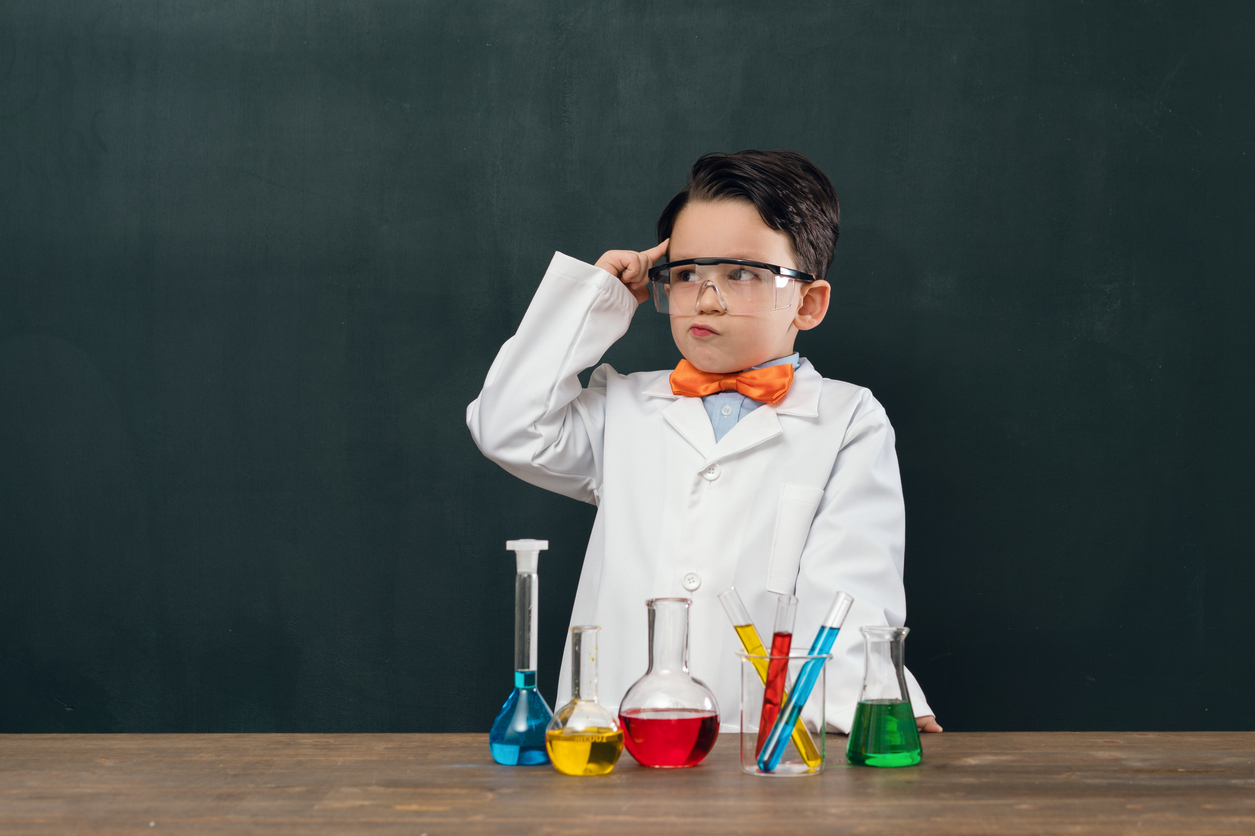Looking for a fun challenge with you and your kids? Test your knowledge of science with these fun questions. From astronomy, to biology, and chemistry, let’s see if you know your stuff! Don’t forget to keep track of your score at the end and remember, have fun!
1. How much of the Earth is covered in water?
Answer: 71%
2. What gas do animals need to breathe to survive?
Answer: Oxygen
3. What is the largest star in our solar system?
Answer: The sun
4. What kind of blood cells fight infections?
Answer: White blood cells
5. How many states of matter are there?
Answer: Three. (Solid, Liquid, Gas)
6. What planet is known as the “Red Planet”?
Answer: Mars
7. How many bones are in the human body?
Answer: 206
8. What gas do plants absorb from the atmosphere?
Answer: Carbon Dioxide
9. What is the largest organ in the human body?
Answer: The skin
10. Name the powerhouse of the cell.
Answer: The mitochondria
Bonus Science Trivia Video
11. Can you name the boiling point of water?
Answer: 100 degrees Celcius
12. How many teeth does an adult human have?
Answer: 32
13. What is the hottest planet in our solar system?
Answer: Venus
14. How many bones do sharks have?
Answer: Zero
15. Animals that eat both plants and meat are called what?
Answer: Omnivore
16. What is the rarest blood type?
Answer: AB
17. How many muscles does a cat have in each ear?
Answer: 32
18. What does a Geiger Counter measure?
Answer:: Radiation
19. What is the center of an atom called?
Answer: Nucleus
20. What is the main gas that makes up Earth’s atmosphere?
Answer: Nitrogen
21. What is the process in which water changes from a liquid to a gas?
Answer: Evaporation
22. What is the most common element in the universe?
Answer: Hydrogen
23. What do you call a scientist who studies rocks?
Answer: Geologist
24. What is the term for animals that are active during the night?
Answer: Nocturnal
25. What do you call a baby frog?
Answer:Tadpole
26. What is the process in which caterpillars turn into butterflies?
Answer: Metamorphosis
27. What are the 3 primary colors?
Answer: Red, Blue, Yellow
28. Where is hereditary information stored in your cells?
Answer: Your chromosomes
29. What process turns a solid into a liquid?
Answer: Melting
30. What is the formula for water?
Answer: H20
31. What is the chemical symbol for gold?
Answer: Au
32. What is the chemical system for iron?
Answer: Fe
33. What is the chemical symbol for carbon dioxide?
Answer: CO2
34. What is the chemical symbol for helium?
Answer: He
35. What is the name of the galaxy that houses our solar system?
Answer: The Milky Way
36. What is the largest moon on Saturn?
Answer:: Titan
37. How many planets are in our solar system?
Answer: Eight
38. What is the name of the largest volcano in our solar system?
Answer: Olympus Mons
39. How long does it take for the Earth to complete one orbit around the sun?
Answer:365 days or 1 year
40. What forms at the end of a star’s life?
Answer:A black hole
41. What is a parsec?
Answer: A unit of length to measure long distances of astronomical objects equal to 3.26 light years
42. How many colors are in a rainbow?
Answer: Seven
43. What instrument is used to measure your temperature?
Answer: Thermometer
44. Which baby animal does not look like it’s parent?
Answer: Caterpillar
45. What are animals that eat dead or decaying matter called?
Answer: Scavengers
46. What is the process which plants use to make food?
Answer:Photosynthesis
47. Which mammal lays eggs?
Answer: Platypus and Echidnas
48. What does photosynthesis produce?
Answer: Water vapour, Oxygen, and Sugar
49. What is the strongest bone in the human body?
Answer: Thigh Bone or Femur
50. What is the speed of light?
Answer: Answer: 299,792,458
51. What part of the plant conducts photosynthesis?
Answer: The leaves
52. What do you call an animal that only eats plants?
Answer: Herbivore
53. What is the unit used to measure electrical current?
Answer: Ampere
54. What type of energy is stored in food?
Answer: Chemical energy
55. Which vitamin is primarily produced when the skin is exposed to sunlight?
Answer: Vitamin D
56. What is the smallest unit of life that can replicate independently?
Answer: A cell
57. What’s the name of the force that keeps planets in orbit around the sun?
Answer: Gravity
58. What is the name of the process where plants lose water through their leaves?
Answer: Transpiration
59. What part of the brain controls balance and coordination?
Answer: The cerebellum
60. What organ is responsible for pumping blood throughout the body?
Answer: The heart
61. What gas do humans exhale?
Answer: Carbon dioxide
62. What is the name of the scientist who proposed the three laws of motion?
Answer: Isaac Newton
63. What is the name of the protective layer around Earth that absorbs most of the sun’s ultraviolet radiation?
Answer: The ozone layer
64. What is the most abundant metal in Earth’s crust?
Answer: Aluminum
65. What is the name of the process that breaks down food into nutrients in the body?
Answer: Digestion
66. What’s the name of the organ that helps filter waste from the blood?
Answer: Kidney
67. What’s the name for molten rock after it erupts from a volcano?
Answer: Lava
68. What planet has a giant red storm known as the Great Red Spot?
Answer: Jupiter
69. Which organ helps humans breathe?
Answer: Lungs
70. What force pulls objects toward the center of the Earth?
Answer: Gravity
71. What type of celestial body is the moon?
Answer: A natural satellite
72. What gas do neon signs contain?
Answer: Neon
73. Which part of the eye controls how much light enters?
Answer: The pupil
74. What instrument is used to see very small objects?
Answer: Microscope
75. What is the term for water falling from clouds as rain, snow, sleet, or hail?
Answer: Precipitation
So, how’d you do? We hope you enjoyed these trivia questions, but remember, the fun doesn’t have to end here. Create your own questions and challenge your kids to expand their knowledge on science and see what you can discover!
More Science & Learning Fun
Explore more kid-friendly facts and questions:




